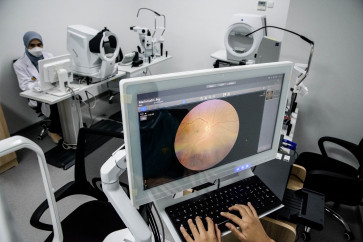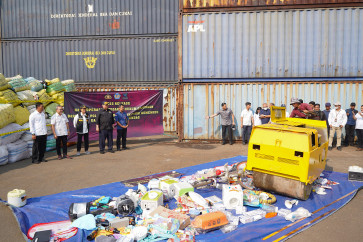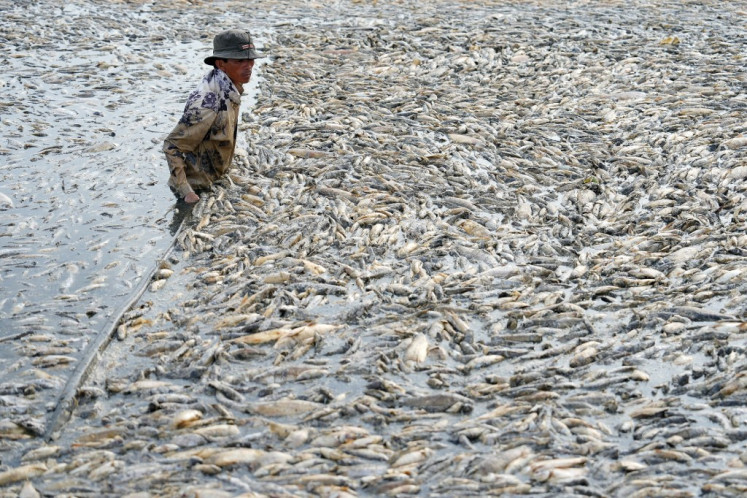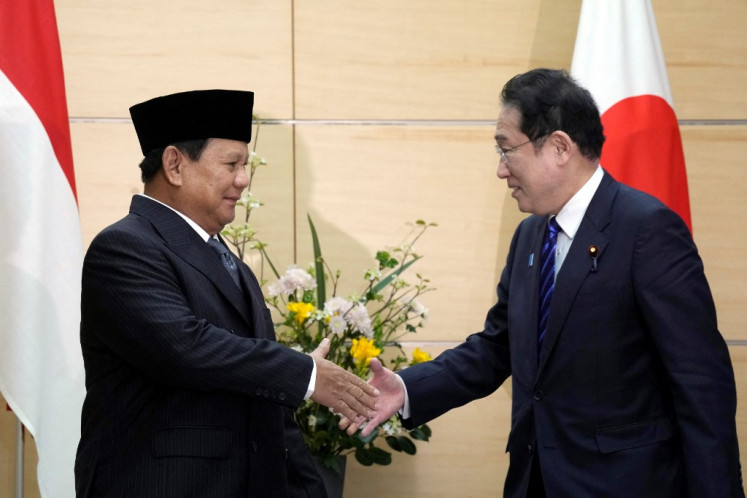How can the children from impoverished families buy soap for handwashing?
PLASTIC PALS: Students of state Elementary School SD Marunda 3, North Jakarta, paint plastic containers to reinforce their learning experience after taking part in a hand washing awareness event on Saturday
Change Size

PLASTIC PALS: Students of state Elementary School SD Marunda 3, North Jakarta, paint plastic containers to reinforce their learning experience after taking part in a hand washing awareness event on Saturday. (JP/Mariani Dewi)
"We (the teachers) have told students to wash their hands during daily morning school cleaning sessions. But I am not sure they have turned it into a habit or if they do it at home," Sri Wulan Safitri, a teacher at a state elementary school in North Jakarta said Saturday during a handwashing awareness event.
While many students heed her advice, the campaign remains far from achieving its goal.
Desy Oktaviani, a fourth-grade student, admitted she hardly ever washed her hands with soap.
"But I do bathe with soap," she said after being teased by her friends upon uttering the confession.
For many of the school's 145 students, hygiene is not a priority.
The public school is located in a poor neighborhood near Tanjung Priok seaport in North Jakarta. To get to school, the 145 children must walk past piles of garbage along a one-meter-wide lane that is flooded with sea water during high tide.
Most students come from impoverished families and live in simple houses with no running water. The majority of the children's parents work as fishermen, ojek (motorcycle taxi) drivers, or laborers.
"Some accompany their parents to catch fish in fishponds. Children also play in the dirt a lot," Fitri said.
"Today, the practice of washing one's hands is a huge movement for our school. Hopefully they now know that other people are doing it too. It is more effective when they themselves want to do it, rather than because they are told to."
After the half-day event, the members of staff also showed signs of having changed.
Head master Paulus Santoso said the school did not provide soap in the student toilets.
"We will do it from now on. We will also try to approach the parents about washing hands. We will also tell the food vendors to wash their hands and to sell healthier food, not just noodles," he said.
Fitri came up with her own idea on how to encourage the practice.
"Usually we hold games and competitions to celebrate Independence Day. Maybe we can have a washing-hands-related competition. We can ask them to wash their hands and look at them under the school's microscope to see whose hands are the cleanest," she said.
The government and many organizations are attempting to encourage a positive attitude toward hygiene by observing Global Handwashing Day.
"But handwashing is not the end. It is the entry point to personal hygiene and health consciousness," said Alwis Rustam, public outreach and communications coordinator of a USAID environmental services program.
"A study we conducted in Sumatra last year showed that people who wash their hands tend to start caring more about their personal hygiene too," he said.
According to a 2008 World Bank report, Indonesia suffers US$ 6.3 billion in state losses per year because of poor sanitation.
Of that figure, an estimated $3.3 billion is spent on an annual average of 120 million cases of hygiene-related illnesses resulting in 500,000 fatalities.
Diarrhea, which is mainly caused by contaminated food or water, is the second and third-biggest killer of toddlers and babies in the country, respectively.
Doctor Handrawan Nadesul said, "The (risk of infection by) worms-related illnesses, SARS and even bird flu can be reduced by the simple act of washing hands with soap and running water. Many sickness and death cases are avoidable.
"The rate of worm infection in Indonesia is very high, at 60-70 percent. Adults can have it, but it is more prevalent among children. Some worms absorb a child's nutrients, slowing down their brain and physical development.
"Others absorb blood and cause anemia. Severe anemia can cause heart attack. It is very saddening for a child to suffer a heart attack just because of a worm infection when the prevention and cure are so simple," he said, adding that public sanitation facilities needed improvement.
"There must be adequate facilities, especially with clean running water, so that worm eggs that are brushed away (when someone washes their hands) are flushed away, rather than attaching themselves to someone else's hands." (mri)









